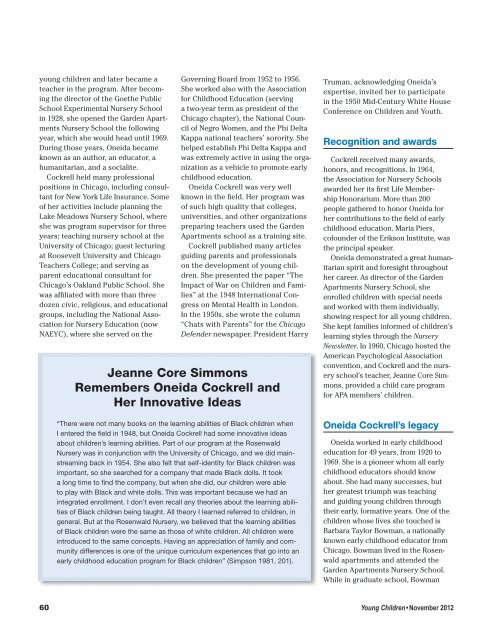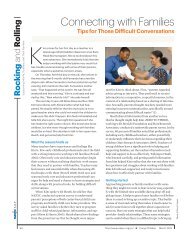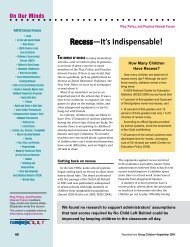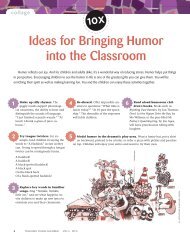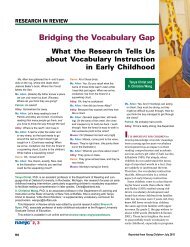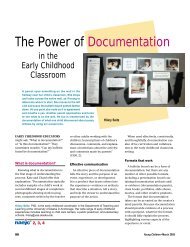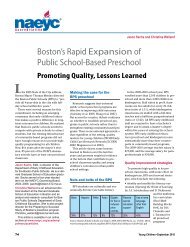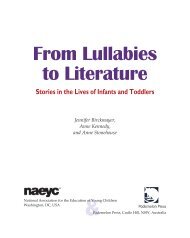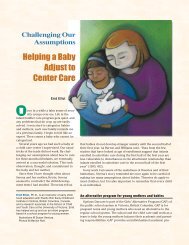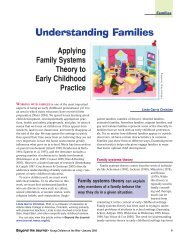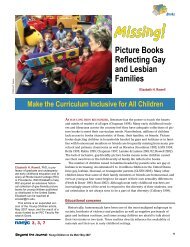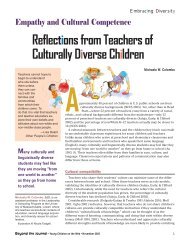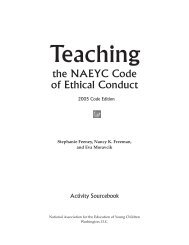Our Proud Heritage. Oneida Cockrell - National Association for the ...
Our Proud Heritage. Oneida Cockrell - National Association for the ...
Our Proud Heritage. Oneida Cockrell - National Association for the ...
You also want an ePaper? Increase the reach of your titles
YUMPU automatically turns print PDFs into web optimized ePapers that Google loves.
young children and later became a<br />
teacher in <strong>the</strong> program. After becoming<br />
<strong>the</strong> director of <strong>the</strong> Goe<strong>the</strong> Public<br />
School Experimental Nursery School<br />
in 1928, she opened <strong>the</strong> Garden Apartments<br />
Nursery School <strong>the</strong> following<br />
year, which she would head until 1969.<br />
During those years, <strong>Oneida</strong> became<br />
known as an author, an educator, a<br />
humanitarian, and a socialite.<br />
<strong>Cockrell</strong> held many professional<br />
positions in Chicago, including consultant<br />
<strong>for</strong> New York Life Insurance. Some<br />
of her activities include planning <strong>the</strong><br />
Lake Meadows Nursery School, where<br />
she was program supervisor <strong>for</strong> three<br />
years; teaching nursery school at <strong>the</strong><br />
University of Chicago; guest lecturing<br />
at Roosevelt University and Chicago<br />
Teachers College; and serving as<br />
parent educational consultant <strong>for</strong><br />
Chicago’s Oakland Public School. She<br />
was affiliated with more than three<br />
dozen civic, religious, and educational<br />
groups, including <strong>the</strong> <strong>National</strong> <strong>Association</strong><br />
<strong>for</strong> Nursery Education (now<br />
NAEYC), where she served on <strong>the</strong><br />
Governing Board from 1952 to 1956.<br />
She worked also with <strong>the</strong> <strong>Association</strong><br />
<strong>for</strong> Childhood Education (serving<br />
a two-year term as president of <strong>the</strong><br />
Chicago chapter), <strong>the</strong> <strong>National</strong> Council<br />
of Negro Women, and <strong>the</strong> Phi Delta<br />
Kappa national teachers’ sorority. She<br />
helped establish Phi Delta Kappa and<br />
was extremely active in using <strong>the</strong> organization<br />
as a vehicle to promote early<br />
childhood education.<br />
<strong>Oneida</strong> <strong>Cockrell</strong> was very well<br />
known in <strong>the</strong> field. Her program was<br />
of such high quality that colleges,<br />
universities, and o<strong>the</strong>r organizations<br />
preparing teachers used <strong>the</strong> Garden<br />
Apartments school as a training site.<br />
<strong>Cockrell</strong> published many articles<br />
guiding parents and professionals<br />
on <strong>the</strong> development of young children.<br />
She presented <strong>the</strong> paper “The<br />
Impact of War on Children and Families”<br />
at <strong>the</strong> 1948 International Congress<br />
on Mental Health in London.<br />
In <strong>the</strong> 1950s, she wrote <strong>the</strong> column<br />
“Chats with Parents” <strong>for</strong> <strong>the</strong> Chicago<br />
Defender newspaper. President Harry<br />
Jeanne Core Simmons<br />
Remembers <strong>Oneida</strong> <strong>Cockrell</strong> and<br />
Her Innovative Ideas<br />
“There were not many books on <strong>the</strong> learning abilities of Black children when<br />
I entered <strong>the</strong> field in 1948, but <strong>Oneida</strong> <strong>Cockrell</strong> had some innovative ideas<br />
about children’s learning abilities. Part of our program at <strong>the</strong> Rosenwald<br />
Nursery was in conjunction with <strong>the</strong> University of Chicago, and we did mainstreaming<br />
back in 1954. She also felt that self-identity <strong>for</strong> Black children was<br />
important, so she searched <strong>for</strong> a company that made Black dolls. It took<br />
a long time to find <strong>the</strong> company, but when she did, our children were able<br />
to play with Black and white dolls. This was important because we had an<br />
integrated enrollment. I don’t even recall any <strong>the</strong>ories about <strong>the</strong> learning abilities<br />
of Black children being taught. All <strong>the</strong>ory I learned referred to children, in<br />
general. But at <strong>the</strong> Rosenwald Nursery, we believed that <strong>the</strong> learning abilities<br />
of Black children were <strong>the</strong> same as those of white children. All children were<br />
introduced to <strong>the</strong> same concepts. Having an appreciation of family and community<br />
differences is one of <strong>the</strong> unique curriculum experiences that go into an<br />
early childhood education program <strong>for</strong> Black children” (Simpson 1981, 201).<br />
Truman, acknowledging <strong>Oneida</strong>’s<br />
expertise, invited her to participate<br />
in <strong>the</strong> 1950 Mid-Century White House<br />
Conference on Children and Youth.<br />
Recognition and awards<br />
<strong>Cockrell</strong> received many awards,<br />
honors, and recognitions. In 1964,<br />
<strong>the</strong> <strong>Association</strong> <strong>for</strong> Nursery Schools<br />
awarded her its first Life Membership<br />
Honorarium. More than 200<br />
people ga<strong>the</strong>red to honor <strong>Oneida</strong> <strong>for</strong><br />
her contributions to <strong>the</strong> field of early<br />
childhood education. Maria Piers,<br />
cofounder of <strong>the</strong> Erikson Institute, was<br />
<strong>the</strong> principal speaker.<br />
<strong>Oneida</strong> demonstrated a great humanitarian<br />
spirit and <strong>for</strong>esight throughout<br />
her career. As director of <strong>the</strong> Garden<br />
Apartments Nursery School, she<br />
enrolled children with special needs<br />
and worked with <strong>the</strong>m individually,<br />
showing respect <strong>for</strong> all young children.<br />
She kept families in<strong>for</strong>med of children’s<br />
learning styles through <strong>the</strong> Nursery<br />
Newsletter. In 1960, Chicago hosted <strong>the</strong><br />
American Psychological <strong>Association</strong><br />
convention, and <strong>Cockrell</strong> and <strong>the</strong> nursery<br />
school’s teacher, Jeanne Core Simmons,<br />
provided a child care program<br />
<strong>for</strong> APA members’ children.<br />
<strong>Oneida</strong> <strong>Cockrell</strong>’s legacy<br />
<strong>Oneida</strong> worked in early childhood<br />
education <strong>for</strong> 49 years, from 1920 to<br />
1969. She is a pioneer whom all early<br />
childhood educators should know<br />
about. She had many successes, but<br />
her greatest triumph was teaching<br />
and guiding young children through<br />
<strong>the</strong>ir early, <strong>for</strong>mative years. One of <strong>the</strong><br />
children whose lives she touched is<br />
Barbara Taylor Bowman, a nationally<br />
known early childhood educator from<br />
Chicago. Bowman lived in <strong>the</strong> Rosenwald<br />
apartments and attended <strong>the</strong><br />
Garden Apartments Nursery School.<br />
While in graduate school, Bowman<br />
60 Young Children • November 2012


